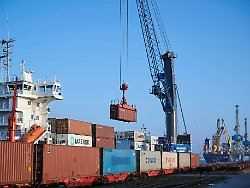Tuesday 29 December 2020
Annual balance: "Desolate"
Foreign trade set back by five years
Germany's companies often live from doing business with customers abroad. The global corona pandemic with its lockdowns and massive restrictions is therefore particularly affecting them. The industry association expects a slump in exports – and advances in digitization.
The corona crisis weighs heavily on German foreign trade. "Covid-19 has thrown us back five years on the export side and at the same time catapulted us forward by five years, especially when it comes to digitization," said Foreign Trade President Anton Börner. The annual balance turns out to be "bleak" in foreign trade as well as in wholesale.
Along with the collapse in global trade in the first three quarters of 8.2 percent, German exports fell by as much as 11 percent between January and October 2020. "In view of the renewed shutdown of the economy in Europe, which after all accounts for a good third of the global goods trade, we expect at least a 12 before the decimal point for the decline in exports by the end of the year," said Börner.
So far, US business has collapsed by almost 16 percent, Great Britain has anticipated the consequences of Brexit, and exports have so far fallen by 18.5 percent. Latin America is down. The only bright spot are China and the rest of Asia, whose importance has continued to increase during the corona pandemic. Export-driven trade is particularly affected
According to the BGA, it doesn't look much better in wholesale. According to him, the export and industry-driven industrial B2B trade, which after the third quarter is nominally 4.6 percent below the previous year's figure, is particularly affected by sector. The same applies to the part of the wholesale trade that specializes in supplying the hospitality industry.
Companies satisfied with crisis policy
The Federal Association of Wholesale, Foreign Trade and Services (BGA) also announced that entrepreneurs were overwhelmingly satisfied with the crisis policy so far. Around 40 percent of entrepreneurs suffered a significant drop in sales as a result of the first lockdown. After many companies were able to fall back on their reserves in the first phase, over 44 percent now see themselves more severely affected by the second, partial lockdown. Most of them assume that they will survive the crisis with wounds.
At the same time, Börner warned against a half-hearted fight against the pandemic. "The corona virus does not forgive mistakes and negligence," he said. The current setback shows that a half-hearted fight against a pandemic costs a high, and by far not just economic, price. "But the German economy is strong, and despite the sharp cut, the structures in this country are ready to take off – thanks to a variety of initiatives and the recourse to our own reserves as well as extensive stability aid," he said.
A rapid economic recovery is possible if vaccines are available in sufficient quantities and the right lessons are learned from the crisis. "More than ever, Germany's future lies in a strong Europe that is gradually assuming its geopolitical role, making itself more independent and setting its own accents in an increasingly multipolar world, for example with new trade agreements," said Börner.
Meanwhile, with the new RCEP, the world's largest trade zone, China not only underscores its claim to political leadership in the region, but also its role as a global creative power. In order not to lose touch and not least to diversify the supply chains, the EU must now vigorously push ahead with negotiations on its own free trade agreements in the region, demanded the BGA President. Börner also expressed concern about skyrocketing freight rates, a lack of capacities and massive problems, including issues such as delivery reliability in shipping.
. (tagsToTranslate) Economy (t) Foreign trade (t) Corona measures (t) Corona crisis (t) Economic crisis (t) German export (t) Exports
